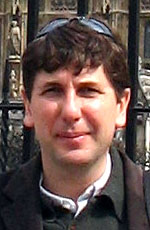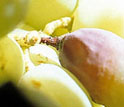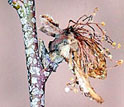
 |
|
Session Announcement: Botrytis
Industry and the Food Chain
Keynote speakers: Peter Schreier and Philippe Darriet Industry has been engaged to counteract Botrytis infections and their adverse effects for more than hundred years. Chemical control remains the main way to reduce grey mould on major crops, thus securing harvest value and quality. Recently a consumer driven desire prompted industry to extend its activity into a food chain partnership of all stakeholders for high profitability, good quality, high value, traceability and sustainabilit. Details of the speakers: Prof. P. H. Schreier  Bayer Cropscience, Alfred-Nobel-Strasse 50, 40789 Monheim, Germany Phone:
*49-2173-38-4514, E-mail: peter.schreier@bayercropscience.com
Bayer Cropscience, Alfred-Nobel-Strasse 50, 40789 Monheim, Germany Phone:
*49-2173-38-4514, E-mail: peter.schreier@bayercropscience.comBiography: 1978 PhD Biology, University of Cologne, Germany. 1979 - 1980 Post-doc Medical Research Council, Cambridge, UK; Massachusetts Institute of Technology, Boston, USA and National Institute for Medical Research in London, Mill Hill, UK 1980 - 1981 Scientific assistant at the University of Cologne, Dept. of Genetics, Since 1982, Research Scientist at Bayer AG and later Bayer Cropscience in Monheim, Germany and 1982 - 2004 Group leader at the Max Planck Institute for Plant Breading in Cologne, Germany. 1992 Habilitation (Genetics) Since 1999 Extracurricular Professor (Genetics) University of Cologne. Current focus: Molecular Biology, Biochemistry and Assay Technology to find new active ingredients against phytopathogenic fungi. Prof. Ph. Darriet  Faculté d'Oenologie, UMR 1219 Oenologie, Institut des Sciences de la Vigne
et du Vin, Université Victor Segalen Bordeaux 2, 351, cours de la libération,
33405 Talence, France Phone + 33 5 40 00 64 88 ; Fax + 33 5 40 00 64 68
; E-mail : philippe.darriet@u-bordeaux2.fr
Faculté d'Oenologie, UMR 1219 Oenologie, Institut des Sciences de la Vigne
et du Vin, Université Victor Segalen Bordeaux 2, 351, cours de la libération,
33405 Talence, France Phone + 33 5 40 00 64 88 ; Fax + 33 5 40 00 64 68
; E-mail : philippe.darriet@u-bordeaux2.frBiography: 1993 : PhD Enology, University Bordeaux 2, France 1993-1994 Technical director Laffort Cie Bordeaux 1994 - 1998 Assistant Professor Faculté d'Oenologie, University Bordeaux 2 2002 Habilitation thesis (Aroma chemistry and biochemistry) 2002 - 2007 Associate Professor Faculté d'Oenologie, University Bordeaux 2 Research focuses on the characterization of varietal aromas and off flavours in wines, on the chemical, biochemical and microbiological aspects related to their release from precursor forms or formation on the grapes and during the vinification and ageing process. The "Botrytis Industry and the Food Chain" Session: Botrytis cinerea causes serious losses in many crop species worldwide. The plant protection industry has devised a multitude of active ingredients to conquer the fungus. Different modes of action were discovered but the fungus developed resistance to many botryticides. Thus a constant need for the search and development of new modes of action and new active ingredients is required. This is a constant challenge which is further extended by a changing environment. Purchasing decisions for plant protection products are increasingly influenced by a request of high value, traceability of the product and sustainability of the whole process. Botrytis cinerea is one of the major causes of deterioration in the taste, aroma and hedonistic qualities of fruits and vegetables. However, under some specific climatic conditions, and on mature bunch of grapes, it can be implicated in a particular rot which can be the starting point for the elaboration of dessert wines. These modifications are related to a very large number of enzymatic activities produced by the fungus that transform the proteic, polyphenolic and aromatic composition of fruits. Sometimes these modifications permit growth of saprophytic fungi, belonging to various species, particularly from Penicillium genus, which produce secondary metabolites with possible hygienic and organoleptic consequences. In this session, Peter Schreier will present different modes of action of synthetic botryticides and the risk of resistance; we will discuss combined efforts to avoid or minimize the adverse effects of resistance and describe activities to discover new modes of action and new botryticidal compounds. Furthermore the integration of the activities of the plant protection industry into the food chain gaining value and safety of food will be introduced. Philippe Darriet will focus on the consequences of Botrytis cinerea grape infection on the aromatic profile of the grapes and wines considering various kinds of rot (grey rot, noble rot and secondary bunch rots). Further speakers will be selected from the abstracts submitted for this session. View/download
abstract (MS Word): Important
Symposium Dates Please
contact the Symposium Secretariat should you require any information or
assistance. Conferences et al Main sponsor: Bayer CropScience Sponsors:
|
||
     |
||
|
Copyright© 14th International Botrytis Symposium 2007. All rights reserved. No part of this website may be reproduced or transmitted in any form without written permission from the Symposium Organizer. |
||